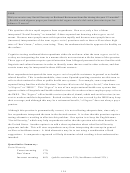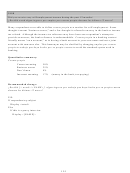Survey Methodology #2003-17 - The American Community Survey (Acs) En Espanol: Using Cognitive Interviews To Test The Functional Equivalency Of Questionnaire Translations - U.s. Bureau Of The Census Page 5
ADVERTISEMENT
EXECUTIVE SUMMARY
Anecdotal information has suggested the existence of potential sources of non-sampling
error that may affect the quality of data obtained in foreign languages or data collected
from respondents with limited English proficiency; however, no empirical data were
previously available to assess the nature and extent of such sources of error. Little is
known regarding the efficacy of current methodologies for collecting data from linguistic
minorities. These methodologies go beyond questionnaire translations that function as
measurement instruments, and include pre-testing techniques, bilingual interviewer
training, interpreter testing and selection, etc.
This study represents the U.S. Census Bureau’s first attempt to apply known pre-testing
techniques as developed in the monolingual English context to the translation of one of
its demographic surveys. The Spanish translation of the American Community Survey
(ACS) Computer-Assisted Personal Interview (CAPI) instrument was used to conduct
cognitive interviews. The research question was to determine how Spanish speaking
respondents understood key terms and questions, and whether those interpretations were
consistent with the meaning of the English questionnaire. Spanish questions whose
meaning reflected the English content were considered to be functionally equivalent.
That is, they were considered to be measuring the same construct without cultural or
linguistic interference (Smith 2002).
The report documents linguistic and questionnaire design challenges that are unlikely to
be unique to the ACS Spanish instrument; rather they are hypothesized to be consistent
across Spanish questionnaire translations. It is also hypothesized that these issues do not
result from inadequate translations or poor translation techniques, but rather stem from
lack of pretesting.
• How do Spanish speaking respondents interpret the meaning of key terms and
questions, and are those interpretations consistent with the English meaning?
About three-fourths of Spanish questions were considered to be functionally
equivalent to the English language CAPI ACS. That is, the meaning of the
English question is adequately conveyed in the Spanish question. For example if
an English question asks about boarders, and the Spanish question asks about
students, then the Spanish question is not considered to be functionally equivalent
to the English question.
• What linguistic issues may contribute to lack of functional equivalence?
Use of words in the target language (i.e., Spanish) with pre-existing bias leads
respondents to interpret those words within a different cultural frame of reference.
Source language (i.e., English) terms that do not translate into the target language
pose additional challenges because the respondent might not have encoded such
concepts. The challenge for terms that can be translated in a variety of ways is
finding which variation is most consistently understood as intended.
iv
ADVERTISEMENT
0 votes
Related Articles
Related forms
Related Categories
Parent category: Legal
 1
1 2
2 3
3 4
4 5
5 6
6 7
7 8
8 9
9 10
10 11
11 12
12 13
13 14
14 15
15 16
16 17
17 18
18 19
19 20
20 21
21 22
22 23
23 24
24 25
25 26
26 27
27 28
28 29
29 30
30 31
31 32
32 33
33 34
34 35
35 36
36 37
37 38
38 39
39 40
40 41
41 42
42 43
43 44
44 45
45 46
46 47
47 48
48 49
49 50
50 51
51 52
52








